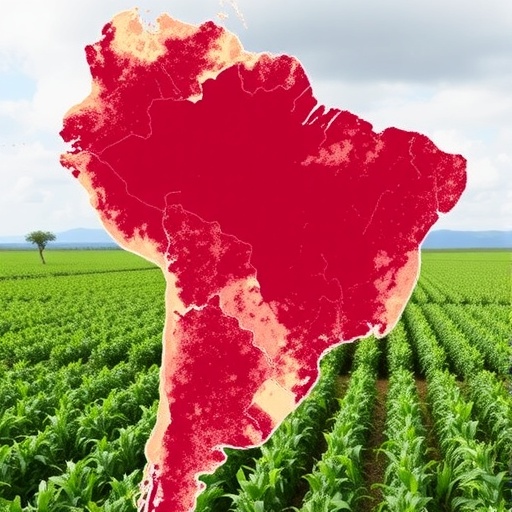Drought is an increasingly pressing issue in agricultural production, particularly in Southern Brazil, where farmers are facing unprecedented challenges. The recent study conducted by researchers Miyamoto and Hackmann delves into the effects of drought on crop yields and agricultural revenue, shedding light on the consequences of climate aberrations that threaten food security and economic stability in the region.
Southern Brazil has been grappling with fluctuating weather patterns over the past few decades, which have been exacerbated by climate change. Extended periods of drought are becoming more common, significantly impacting the agricultural landscape. This trend prompts an urgent need to understand how these changes affect not just crop production, but also the livelihoods that depend on farming. The findings from Miyamoto and Hackmann indicate that drought conditions lead to significant reductions in crop yields, a phenomenon that cannot be overlooked in terms of its economic implications.
A key component of the research explores the relationship between drought severity and the agricultural outputs in Southern Brazil. The data collected reveals a striking correlation: as drought severity increases, crop yields drop dramatically. For instance, staple crops such as soybeans and corn, which are critical to the regional economy, suffer considerable losses under prolonged dry conditions. The study meticulously highlights how these reductions translate into lower agricultural revenue, affecting not only farmers but entire communities reliant on farming income.
The study’s authors employ an array of sophisticated analytical techniques to quantify the economic impact of drought in Southern Brazil. By using historical data to model future scenarios, they provide valuable insights into potential outcomes if current trends continue. With climate models predicting more frequent and severe drought events, the researchers warn that the agricultural sector in the region could face dire consequences, necessitating immediate adaptation strategies to mitigate these risks.
Moreover, the research addresses not just the economic implications but also the broader societal effects of drought-induced agricultural decline. The loss of crop yields can lead to higher food prices, which disproportionately affects low-income households. This cyclical pattern of poverty exacerbation is especially concerning, as vulnerable populations may find themselves more susceptible to food insecurity and economic instability. Understanding this interrelationship is crucial for policymakers aiming to develop targeted interventions that address both agricultural resilience and food access.
Another notable aspect of Miyamoto and Hackmann’s research is the consideration of farmer adaptability. The study highlights various strategies that farmers are currently employing to combat the effects of drought. Innovations in irrigation technology, drought-resistant crop varieties, and sustainable farming practices are among the adaptive measures discussed. However, the adoption of these strategies can be hindered by financial constraints and lack of access to resources, pointing to the need for systemic support from both government and private sectors to ensure that farmers can implement these adaptations effectively.
Additionally, the findings underscore the importance of research investment to foster greater agricultural resilience in the face of climate change. With mounting evidence that current agricultural practices are insufficient to cope with prolonged droughts, there is a compelling argument for governments and organizations to prioritize funding for agricultural research. This investment could facilitate the development of more robust crops and agricultural systems capable of withstanding the vicissitudes of climate change, ultimately securing a stable food supply for future generations.
The role of policy in mitigating the effects of drought is also addressed, emphasizing the necessity for strategic planning at both local and national levels. The authors advocate for adopting comprehensive policies that focus on sustainable land use, water management, and climate adaptation strategies. These should include incentives for farmers to engage in environmentally friendly practices and support for infrastructure improvements to enhance water availability, which is vital during drought periods.
In conclusion, the study by Miyamoto and Hackmann serves as a clarion call for immediate action in response to the challenges posed by drought in Southern Brazil. The profound implications for agricultural yields and economic stability emphasize the urgency for stakeholders to collaborate on innovative solutions. As climate change continues to relentlessly advance, the need for adaptability in agricultural practices becomes increasingly paramount.
It is critical for farmers, researchers, policymakers, and community leaders to collectively work towards building a resilient agricultural framework that can endure the harsh realities of climate change. By embracing research, investing in technological advancements, and fostering sustainable practices, Southern Brazil can better navigate the uncertainties of drought and maintain its position as a vital player in global agriculture.
Subject of Research: Effects of drought on crop yields and agricultural revenue in Southern Brazil
Article Title: Effects of drought on crop yields and agricultural revenue in Southern Brazil
Article References:
Miyamoto, B.C.B., Hackmann, C.L. Effects of drought on crop yields and agricultural revenue in Southern Brazil.
Discov Agric 3, 246 (2025). https://doi.org/10.1007/s44279-025-00425-y
Image Credits: AI Generated
DOI: https://doi.org/10.1007/s44279-025-00425-y
Keywords: Drought, Crop Yield, Agricultural Revenue, Southern Brazil, Climate Change, Food Security, Economic Impact, Adaptive Strategies.




